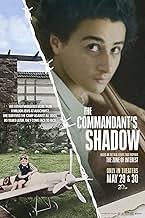The Zone of Interest told the story of Rudolf Hoess, the family man. Hoess was the commandant of Auschwitz and was - in the words of his grandson - responsible for more murders than anyone else in history. Hoess lived with his wife and children in a beautiful house just outside the camp. This film centres mainly on his son, Hans-Jurgen, who was seven or eight years old when the war ended.
He obviously has a child's memory of the camp, recalls his father as a loving parent, and considers his childhood a happy one. Pressed by his own son, Kai, he says he didn't know what was going on over the garden wall. Kai asks if he's repressed his memories out of self-defence. The old man doubts this, but it's difficult to believe that he hasn't. He seems to have spent most of his life avoiding questions about his father. Frankly, I don't blame him.
Hans is also reunited with his older sister, now living in America (and who, for unexplained reasons, he's not met for more than fifty years). She is equally certain that she didn't know the truth at the time, and doesn't want to talk about it now. Confronted directly, she finds it very hard to say a bad word about either of her parents - though it's notable that her mother's grave (she died in 1989) just says "Mutti" (German for Mummy). The Hoess name is absent.
A second strand of this film concerns Anita Lasker-Wallfisch, now ninety-eight but still with sharp wits. She survived Auschwitz because she was wanted for the camp orchestra. She's remarkably stoic, and discusses the past reluctantly, and with a lack of passion. Her daughter Maya, however, is a restless soul who wants to know about the family history. Though born and brought up in Britain, she wants to move "back" to Germany - even though her parents' home town is now in Poland. She also visits a memorial to her grandparents (and others).
It's significant that it's the younger generation - Kai and Maya - who feel a need to learn the truth, whilst the older generation needs to have it teased from them.
At the end of the film, Hans and Anita meet. It's strangely anti-climactic. But then, what could either of them say? What could anyone say?
Are the sins - and the sufferings - of the parents to be visited on their descendants? It seems that here they are. It's been eighty years, but World War Two hasn't yet claimed its last victim.

























